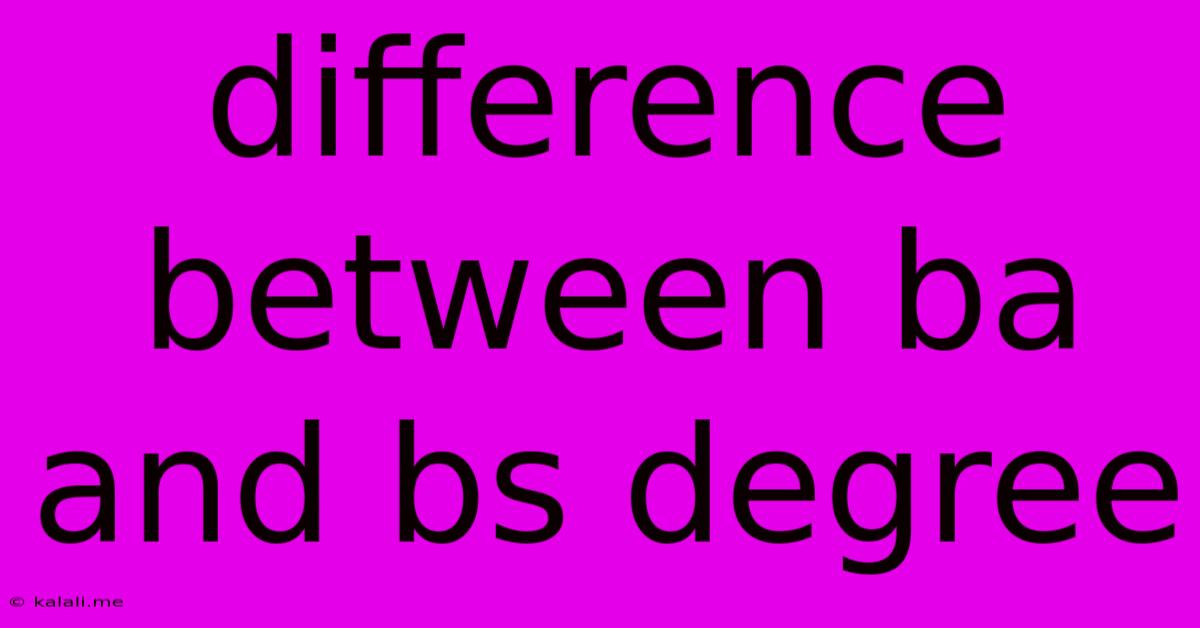Difference Between Ba And Bs Degree
Kalali
May 21, 2025 · 3 min read

Table of Contents
BA vs. BS: Unveiling the Differences Between Bachelor of Arts and Bachelor of Science Degrees
Choosing the right undergraduate degree is a crucial decision impacting your future career path. Two common choices often leave prospective students confused: the Bachelor of Arts (BA) and the Bachelor of Science (BS). While both are four-year undergraduate degrees, they differ significantly in their focus, curriculum, and career outcomes. This article clarifies the key distinctions between BA and BS degrees to help you make an informed decision.
The fundamental difference lies in the emphasis on theoretical versus applied knowledge. BA programs prioritize critical thinking, analysis, and the exploration of theoretical concepts within a specific field. BS degrees, on the other hand, focus on practical application, scientific methodology, and technical skills. This core difference influences the curriculum structure, course requirements, and ultimately, the type of career opportunities each degree prepares you for.
Curriculum and Course Structure: A Tale of Two Approaches
A BA degree typically involves a broader curriculum with a heavy emphasis on humanities, social sciences, and liberal arts. Expect a mix of core courses and electives allowing for greater flexibility in shaping your academic path. You might find more room for exploring diverse subjects, fostering well-rounded intellectual development. Think literature analysis, historical research, philosophical debates, and sociological studies.
A BS degree generally presents a more rigorous and specialized curriculum, concentrating on scientific principles, quantitative methods, and practical laboratory work. The coursework tends to be more mathematically and scientifically intensive, equipping graduates with advanced technical skills and in-depth knowledge in their chosen field. Expect to encounter rigorous science labs, complex mathematical models, and detailed technical instruction.
Career Paths and Outcomes: Diverging Trajectories
The career paths open to BA and BS graduates often diverge based on the degree's inherent focus. BA graduates are often well-suited for roles requiring strong communication, critical thinking, and problem-solving skills. These might include careers in journalism, marketing, public relations, social work, education, and many roles within the humanities and arts. The broader education often allows for adaptability across various industries.
BS graduates, armed with technical proficiency and in-depth subject matter expertise, typically pursue careers in science, technology, engineering, and mathematics (STEM) fields. These might include roles in software engineering, data science, biomedical research, engineering, and various specialized scientific roles. The technical skills and applied knowledge make them particularly desirable in highly specialized industries.
Choosing the Right Path: Aligning Your Goals and Aspirations
The ultimate choice between a BA and BS hinges on your individual career aspirations, learning style, and personal interests. Ask yourself these crucial questions:
- What are my career goals? Do I envision a career requiring strong analytical and critical thinking skills (BA) or technical expertise and practical application (BS)?
- What are my academic strengths and interests? Am I drawn to theoretical explorations and abstract concepts (BA) or practical applications and hands-on learning (BS)?
- What type of learning environment suits me best? Do I thrive in a flexible, interdisciplinary setting (BA) or a more structured, specialized curriculum (BS)?
Answering these questions will help you identify the degree that best aligns with your academic goals and future career path. Both BA and BS degrees offer valuable opportunities, but understanding their fundamental differences is crucial in making an informed decision. Remember to research specific programs within your area of interest to gain a deeper understanding of the curriculum and career prospects. Talking to career counselors and professionals in your chosen field can also provide valuable insights.
Latest Posts
Latest Posts
-
Yours Faithfully Or Yours Sincerely When To Use
May 21, 2025
-
How Long For Concrete To Set Before Rain
May 21, 2025
-
Can You Tile Over Painted Walls
May 21, 2025
-
What Is The Square Root Of 8
May 21, 2025
-
Do Cats Talk To Each Other
May 21, 2025
Related Post
Thank you for visiting our website which covers about Difference Between Ba And Bs Degree . We hope the information provided has been useful to you. Feel free to contact us if you have any questions or need further assistance. See you next time and don't miss to bookmark.